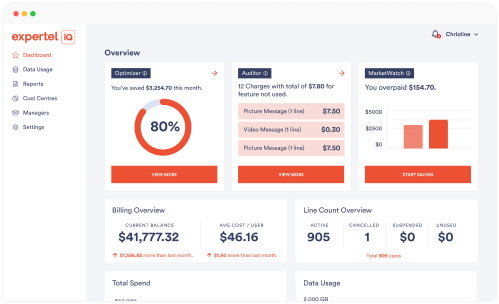6 Mistakes commonly made when negotiating your corporate wireless contract
In this Article:
Telecom expense management is a complicated subject to any business, since there are simply too many options on the table to take into account when negotiating wireless or mobile contracts. You’ll probably find yourself a little overwhelmed with lots of doubts about whether you’re choosing the best deal available. Don’t worry, it happens to everybody!
If you’re aiming to reduce costs on your telecom expenses, or just trying to find the best deals for your business, this blog entry we’ll be going over some of the most common mistakes people make during carrier contract negotiations. Get your notepad ready because we’ll also give you some useful tips to make the most of them. Before we jump in, we think it’s important to have a general idea of your company needs. This will make it a lot easier to navigate through the myriad of plans carriers offer, and keep you away from unnecessary costs that hurt your bottom line. This exercise can also help you plan future expansions carefully, which means you will be avoiding extra costs due to hurried decisions and improvised solutions. Ok, now that you know what you need, it’s time to go through some of the most common mistakes people make during carrier contract negotiations.
-
1. Starting the process too late
Mobile contract negotiation can be a time-consuming endeavor, but if timed correctly, it can also bring you great advantages in the long term. You see, most companies believe they need to finish their contract in order to begin a new one, but that’s not true. By renegotiating your next contract about 6 months earlier you can lock in a better price for your service. In the long run, it means you will be able to squeeze in an additional renegotiation opportunity, which can get you a significant cost reduction in your expenses.
-
2. Keeping “Zombie Lines” Alive
“Zombie lines” add wasteful costs to your plan, so before you jump straight to your mobile contract negotiation, clean up your account to be sure that every line is being actively used. Keeping tabs on how many lines you actually use can have a big impact on your budget since you’ll be tied to them for the duration of your contract. To put it simply, if you’re focused on mobile expense savings, any unused lines should not be included on your next contract.
-
3. Not Thinking Ahead
Planning your telecom expense management in advance can make your business’s growth, a quick and seamless experience. Although you might be tempted to sign a contract that fits your current needs, you should always think about what your needs might be in the future as well. If you have an opportunity to expand your business in the horizon, make sure you have options for larger data plans in available in the future during your carrier negotiation to increase your mobile expense savings in the long term
-
4. Taking the First Offer
Although carrier contract negotiations can be a little bit of a hassle sometimes, taking the time to do it right will always make a huge difference when it comes to cost reduction. As a rule of thumb, never take the first offer. Instead, make a list of your precise needs and ask about the plans that feature all or most of the items in your list. Then listen to what they have to offer and compare the options, or ask more questions about them. If they don’t offer what you need, or you think the price is too high, you can always look elsewhere.
-
5. Skipping Testing
Most people trust their providers to constantly improve their network with new technology to make their signal stronger or clearer, however, blind trust isn’t always rewarded. During your mobile or wireless carrier negotiation with a new provider, always make sure to test their signal strength wherever you’ll be needing their services. If your business has different locations, then repeat the test at every location to make sure that the service you’re getting is worth the money you’re paying.
-
6. Not taking full advantage of “Contract Times”
Carriers and service providers work just like any other business. They, too, are pressed to show good numbers to their bosses. This means that the best time to make the most out of your wireless or mobile contract negotiation is at the end of the quarter, or the end of the year. It’s during these times most providers will roll out the best deals to keep you with them, or entice you into signing up. Pay attention to the deals around these times and you’ll surely find lower prices and better offers such as plans with buy back phones.
Now that we’ve learned from the most common mistakes people make during carrier contract negotiations, we think it’s important to remind you that you should never feel obligated to sign a contract that you don’t feel comfortable with. After all, telecom companies are a business, and as such, will be trying to get the most money out of every negotiation. It might sound obvious to some, but when you’re dealing with a service that you don’t know much about, it might be tempting to go for the first thing they offer or even worse, the most expensive plan they have, thinking it will come with all of the features they provide.
So that’s it for this entry, but if you still have any doubts about how to get the best deal for your business’s telecom contract, feel free to get in touch with us at Expertel to get customized attention.
We find the hidden savings in your wireless bill.
Expertel iQ is your cloud-based savings consultant. We optimize how much you can save per month by adding and removing account features based on what you’re actually using. Never pay for unused lines or redundant features again.







